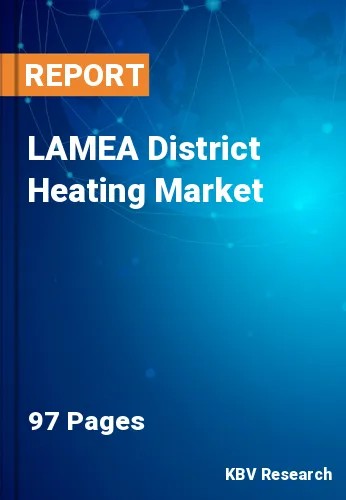The Latin America, Middle East and Africa District Heating Market would witness market growth of 12.0% CAGR during the forecast period (2022-2028).
Because renewable and waste heat sources are more accessible, it is believed that district heating will be an integral feature of the future energy system. The overall energy efficiency of district heating is greater than that of individual heating, despite challenges such as rapid efficiency improvement in individual heating and energy-saving measures.
A comprehensive review of the recent development of district heating systems, introduces the fundamental technologies, system design, and integrated urban planning for a future district heating system, focusing in particular on the measures for multiscale demand-side management to improve district heating system performance.
Through water-based distribution networks, often known as district energy systems, district heating offers substantial energy savings. Currently, district heating holds an average of only 9 percent of the EU's heat market. A district heating system is a network of underground, insulated pipes that transport hot water or steam. Similarly, a central chilling plant can produce chilled water for a district cooling network.
District cooling is a relatively recent solution, although it is based on the knowledge gained in district heating. District heating and cooling can facilitate the cost-effective transition to renewable energy. In conjunction with heat storage, they can stabilize NZEB's energy supply. However, they necessitate an up-front expenditure of capital and include a multitude of institutional, technological, legal, and financial considerations and concerns.
UAE is a large oil exporter and producer. In 2019, the nation produced an average of 4.0 million barrels of oil and other liquids per day, ranking sixth in the world. To help meet expanding domestic demand, the UAE plans to increase domestic natural gas production in the next years. Large quantities of sour (high-sulfur) gas may considerably contribute to the growth. To meet rising demand, the UAE intends to boost its ability to generate electricity from nuclear, renewable, and coal-fired sources, but it now relies primarily on natural gas.
The Brazil market dominated the LAMEA District Heating Market by Country in 2021, and would continue to be a dominant market till 2028; thereby, achieving a market value of $2,877.8 million by 2028. The Argentina market is experiencing a CAGR of 12.5% during (2022 - 2028). Additionally, The UAE market would display a CAGR of 11.4% during (2022 - 2028).
Based on Application, the market is segmented into Residential, Commercial and Industrial. Based on Plant Type, the market is segmented into Combined Heat & Power, Boiler Plants and Others. Based on Heat Source, the market is segmented into Natural Gas, Coal, Oil & Petroleum Products, Renewables and Others. Based on countries, the market is segmented into Brazil, Argentina, UAE, Saudi Arabia, South Africa, Nigeria, and Rest of LAMEA.
Free Valuable Insights: The Global District Heating Market is Predict to reach $231.3 Billion by 2028, at a CAGR of 6.1%
The market research report covers the analysis of key stake holders of the market. Key companies profiled in the report include Fortum Corporation, Vattenfall AB, ENGIE, The Danfoss Group, Statkraft AS, LOGSTOR Denmark Holding ApS (Kingspan Group PLC), Vital Energi Ltd., Alfa Laval AB, SHINRYO CORPORATION, and NRG Energy, Inc.
By Application
By Plant Type
By Heat Source
By Country
Our team of dedicated experts can provide you with attractive expansion opportunities for your business.

